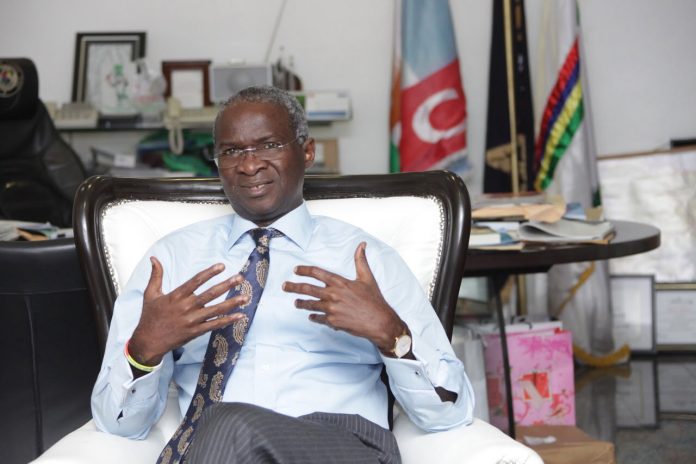As public servant, Babatunde Raji Fashola has always been guided by the prudence of data and statistics in his conduct of public affairs. That is how he was able, in July this year, to debunk the claim that Nigeria had a 17 – 22m housing deficit as at 2012!
Speaking on New Solutions for Nigeria’s Urban Housing at a Lafarge Africa Plc quarterly webinar- Concrete Ideas, Fashola, who was Special Guest of Honour at the webinar, said: “I will start my intervention at this session by inviting our attention to the slide on page 16 of the notice of this event sent to me, which deals with Housing Challenges in Nigeria under the memo highlighting a housing deficit estimated at 22 million homes, under the caption ‘Housing Challenges’.
“That is the misdiagnosis of the problem. Nigeria does not have a housing deficit of 22 million homes. There is no proven data to support that statement or claim. I have spent the better part of the last two weeks discussing this subject. Let me play back a portion.
“When I took office as Minister for Works and Housing, one of the things that I was confronted with was 17 million homes. How could we deliver that? Where is the data? What is the source? And somebody said World Bank. So I invited the Country Manager of the World Bank and said this is credited to you. He said we had no hand in it. Somebody said it was Africa Development Bank (AfDB).
“And so I sent for the Country Representative of AfDB, and he said we knew nothing about it. And so, I said where could I go again? I called the DG of the Nigeria Bureau of Statistics (NBS). I said DG, you keep our data and numbers. Do you have data about the number of people who need homes in Nigeria? He said no we don’t have it.
“But where did this figure of 17million come from? He said minister, calm down. Let’s reason through this. I have one data that is very credible, very reliable. I have a data of households in Nigeria because we did that study, we have the data. And we have 35 million households for the whole of Nigeria.
“The household by the way is one family. He said if your analysis is correct and 17 million is the deficit, it means that half of Nigeria is homeless. That doesn’t stand up to logic. Off I went to the National Population Commission that does the census. I said the next census must include the home ownership and home rental census. I want to know, because we can’t solve a problem that we can’t measure. It was not possible
“And I kept digging, and I found where 17 million came from. I found out that it came from my ministry. In 2012, there was a policy document. And in the preface, somebody just put it there. I have called my predecessor on this desk and I asked did you sign this thing? He said yes. And our position is that there was no data to support what was said. So, quote me; Nigeria does not have 17 million or 22 million housing deficit. It is a lie.”
As Governor of Lagos State, Mr. Fashola, SAN, tended always to measure the success of the policies and actions of his government in terms of their impact on as many people in different of Lagos State as possible.
It is that admirable sense of efficiency and equity that guided his conduct as governor that he has brought to bear on his management of the critical Works and Housing Ministry since 2015 as a minister.
While Nigeria’s housing deficit may not be 17 or 22m as earlier touted, Fashola does recognise that a big deficit does, indeed, exist, hence the pragmatic steps the Federal Ministry of Works under his watch has since taken to deliver President Muhammadu Buhari’s developmental agenda of addressing housing needs in Nigeria, through the construction of acceptable and affordable houses in the 36 states of the federation and Abuja, under the First Phase of the National Housing Programme (NHP), which commenced in the 2016 financial year in 34 states and the FCT.
What is even more admirable about the NHP is that under it, the ministry is promoting local content in line with the Executive Orders 3 and 5. Needless to say that the use of available local building materials has stimulated the economy through the production and use of these materials, resulting in a robust economic value chain engendered by construction activities undertaken mostly by Nigerian youths, the segment directly involved in the physical production of the houses.
Now consider the statistics: under the NHP, a total of 1,021 building contractors have been engaged under phases I and II of the programme since its inception in 2016. Concomitantly, 13,680 and 41,040 direct and indirect jobs have been generated therefrom, while the Works and Housing Ministry, during the period under review, has undertaken the construction of some 4,694 housing units, with 2,249 units completed in 34 states and FCT (apart from Lagos and Rivers) on 41 sites spread across the 34 states and the FCT.























![Green Building Materials Market Trends [2023-2030]](https://housingcable.ng/wp-content/uploads/2022/04/csrgreen-building_Cisco_04222022-218x150.png)









